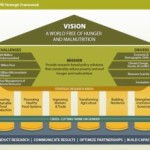In the field of food policy, nutrition and resilience are strongly interlinked conceptually—and now Charlotte Dufour, Domitille Kauffmann, and Neil Marsland are trying to bind the two much more tightly in practice.
Resilience, according to the Food and Agriculture Organization of the United Nations (FAO), is “the ability to prevent disasters and crises as well as to anticipate, absorb, accommodate, or recover from them in a timely, efficient, and sustainable manner.”
Nutrition, in turn, is both an input to and an outcome of resilience. Well-nourished individuals are healthier, can work harder, and have greater physical reserves; nutrition-secure households are thus better able to withstand external shocks. Conversely, households that are most affected by shocks and threats face the greatest risk of malnutrition—that is why strengthening resilience is essential to efforts to reduce malnutrition.
But how do we effectively link these two agendas? In their 2020 conference brief, Dufour, Kauffman, and Marsland outline the rationale for better integration, clarify the role of food and agriculture in each of these agendas, and define potential synergies between nutrition and resilience concepts and programs.
Their recommendations are both concrete and numerous. Building on the four pillars of FAO’s Resilience Strategy, the authors provide operational recommendations for enhancing the nutritional impacts of approaches designed to increase resilience to food and agricultural shocks. Recommendations include how to (1) enable the legislative and policy environment, (2) better integrate nutrition-related information in food and agricultural information systems, (3) reduce the risk of exposure to shocks and mitigate the impact of a shock, and (4) ensure that the response to the shock is adequate, timely, and effective.
In doing so, they identify key entry points for nutrition-sensitive programming to build resilience and give specific examples of nutrition-friendly resilience programming.
They realize that this process of integration will not be quick. “Challenges remain in transforming these opportunities into action. While the discourse on resilience has been gaining ground, capacities to operationalize the concept at the field level remain weak. Similarly, translating the growing commitment to nutrition into action is held back by limited capacities for multisectoral nutrition programming and for mainstreaming nutrition into other sectors, including agriculture.”
A main contribution of their brief, then, is that it provides a clear roadmap of recommendations, allowing further practical and operational research to test their feasibility and effectiveness in a variety of contexts.





